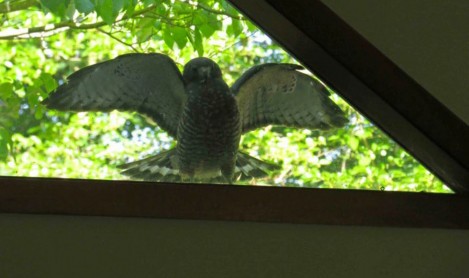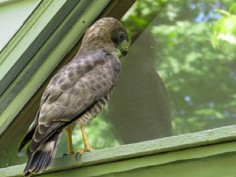Alfred Maley

Figure 1. Broad-winged Hawk attacks its reflection. All photographs by the author.
Most readers of Bird Observer will have witnessed a songbird or two attacking its image in the rearview mirror of a car or in the window of a darkened room. This behavior has been termed “shadow boxing” and most often involves male birds during the nesting season. However, it was with some surprise that we found a Broad-winged Hawk (Buteo platypterus) doing the same thing at several of the windows of our living room in mid-June. It was frightening, in fact, since the bird would leap at the window from the ledge and make a resounding thump each time. Much flailing and flapping of wings was involved, as well as continual calling.
Fearing for the safety of both the hawk and our windows, I took to shouting obscenities at the bird and waving my arms in its face. It was extremely tame—or very focused—and took some convincing to stop, which it finally did after a day or two. During those couple of days the bird would go around the house, perch in the crab apple and dogwood trees close by, and launch its attacks by flying to the window ledge and letting its rival have it. The photos show the bird contemplating its image while taking a rest break and then flapping its wings during an attack.
This hawk was one of a pair that was nesting in the pine trees behind my next-door neighbor’s house. Although I did not precisely locate the nest, it could not have been more than a hundred yards away and at that date would have had large young. A nearby nest for the hawk would be consistent with observations of songbirds which show that this behavior is exhibited more intensely the closer the mirror or window is to the nest. Shadow boxing mostly involves males, but we did experience a pair of Stonechats (Saxicola torquatus) during the winter of 2016 in Spain that would attack the rear-view mirrors on our vehicle—the male on one side and the female on the other. These attacks occurred during a time when they likely had young in the nest.

Figure 2. Broad-winged Hawk contemplating.
It’s likely that all birds—and dinosaurs—will attack their image during the nesting season. Perhaps it’s only a lack of opportunity that results in very few observations of raptors doing this sort of thing. I’ve been informed of two articles that describe shadow boxing by a Cooper’s Hawk (Accipiter cooperii) in North Carolina and a Red-tailed Hawk (Buteo jamaicensis) in Ontario: www.charlotteobserver.com/living/home-garden/article23108277.html and discoveryportal.ontla.on.ca/en/about-parliament/the-legislative-building/architecture/hawks-gallery (See slide 5 in the photo slide show.).
In the case of the Broad-winged at our house, the behavior may have been triggered when the hawk took the nestlings from an American Robin’s (Turdus migratorius) nest that was in a crab apple tree just ten feet from the living room window. This predation happened the day before we started observing the hawk attack our window. Perhaps the hawk noticed itself for the first time during the episode with the robin nestlings.
Recalling that Peregrines often nest near mirror glass in our cities, I thought that there should be reports of shadow boxing by falcons. However, I could not find such reports. Many falcon nest boxes have one-way mirrors that the birds completely ignore. Perhaps falcons quickly get used to the mirrors and then disregard them. I’m pleased that our Broad-winged Hawk is now ignoring our windows, at least until next year.
For much more information on shadow boxing by birds, including some great pictures, see shadowboxingbirds.wordpress.com/literature/.
On a related theme, magpies—and possibly other corvids—seem to be the only birds that can recognize themselves in a mirror.
But that’s a topic for another article.
Thanks to James Maley for researching the subject and providing the above references.